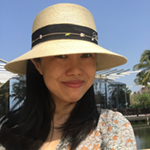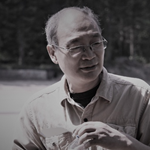Three Poems
Beautiful New World
We kept questioning and peeing
towards Duchamp’s urinal. Mutt brand. But now it is out of production for long.
Had a pleasant breakfast. Rice porridge, corn and cabbage (non-GMO).
Watch the headline news. Big Benz in the Forbidden City. Democratic Party
officially launched impeachment against Trump. It has always been smoggy for more than twenty days.
The sky is gray, as if you were in an old photograph of the Republic of China.
Or peep here from the coming years.
Fall in love with the huge cube of dreams. It’s like a memorial day.
A room or a uterus. In it our desires are growing gaily.
Wishes are packaged, tied with a bow tie, and mimic the good weather.
The card says: Love, your neighbors, if he (she) is of the same sex.
We wear shorts of CK brand and drink Evian mineral water.
We have famous cars and luxurious mansions of tens of millions of yuans.
Although they are a little expensive, we are willing to pay.
We have to pay for the right future. Correct future rather than just future.
We are not living in the Middle Ages. We are just alive.
But this is not the point. Carefully stare at our goals.
It was carefully designed and made. Just like Duchamp’s urinal.
He renamed it “Fountain”, but it was actually very cheap.
Outside the window, heavy snow is falling.
It seemed that the anger and the depression of the whole winter were suddenly spit out.
The light becomes loaded. I’m watching through the window. Listen to Du Pré ’s
performing
Sonata in G minor by Edmund Rubbra, works No. 60.
My heart trembles on the strings. Maybe I should say something
but there is nothing to say. The dead are dead, and they
were allowed to remain silent forever. There is no need to wear a mask in heaven, and
of course
there are no viruses or lies. Living people hiding at home
continue to fear or continue to be shameless. Bats take off in the dark
with a message of death. At the moment there is only music, soothing my sorrow.
There are also poems, recording this moment of pain.
But I will still look out of the window. Snow. Snow. Snow.
A heavy snow covered the world, like death.
This is not a poem
This is the wall. This is a button on the wall. This is a beetle.
This is a cigarette butt. This is a stone. This is a button.
This is cinder on the wall. This is night. The detritus of the night.
This is a button. This is a button on the wall. This is a nail.
Or traces left by nails. This is a stain. This is a virus.
This is the shadow of the lungs. This is time. This is the end of time.
This is a beetle. This is the evidence left by a smashed-dead beetle.
This is death. This is a cigarette butt. This is a button on the wall.
This is sand. A grain of sand or a universe.
This is a virus. This is the shadow left by the virus in the lungs.
This is a beetle. Here is the evidence left after the beetle was smashed to death.
This is night. This is daytime. This is their residue.
This is a stone. This is cinder. This is the carbon core after cinder is burned.
This is a shadow. This is confusion. This is a rag. This is a nail.
This is a nail nailed into the wall. This is a hole left
after a nail is pulled out. This is an ink dot. This is confusion. This is thinking.
This is the excrement of thinking. This is memory. This is the sorrow of memory.
This is grief. This is despair. This is death. This is
the signature of death. This is sand. This is a desert.
This is an earthly world. This is a covenant. This is a button on the wall.
This is the mother’s tears and the baby’s crying. This is a cigarette butt.
This is the glove dropped by death. This is a cookie.
This is a toy. This is a start button. This is a lie.
This is acne and freckles. This is a letter.
This is an engine. A car. A manned spacecraft.
This is a black hole. This is the time to stop. This is a question. This is a miracle.
This is a virus. Conspiracy of virus and lung. This is a wall.
This is a button on the wall. This is a poem. This is not a poem.
A Movie: A Quiet Place
Wear a mask in spring. N95. It imprisons us.
Death. Cold ban. I am a walking virus.
To be exact, a time bomb that ticks constantly and can be detonated at any time.
The soul is withering day by day, like a vase of flowers.
It longs to jump out of its flesh and embraces the scenery outside the window.
But the landscape is a bird, locked in a corroded cage.
In the afternoon, sunlight penetrates into the window like snow, cutting the room into two equal parts.
I curl up on the floor, watching a horror movie.
Monster is killing humans, but humans cannot see it.
It finds us through the air. We dare not make a sound.
We study hard how to keep silent and cover our children’s mouth in due time.
Feel fortunate to be still alive in corpse-like silence.
translator’s note:
Shuguang Zhang is one of the most influential poets active in contemporary Chinese poetry. With their uniqueness and experimental writing styles and the juxtaposition of modern and ancient cultural elements, Shuguang Zhang’s poems reflect both the characteristics of traditional Chinese poetics and aesthetics as well as the influence from Western poetics.
He began to write poetry when he was in college, pursuing a solid and tough poetic style in the past. Tao Yuanming (352/365AD–427AD), a famous recluse poet who is founding father for Chinese pastoral poetry is said to be Shuguang Zhang’s favorite Chinese poet, and he is also influenced by some Western poets such as New York school poets and language poets. Zhang has noted that Chinese Zen-Taoism thinking also serves as a fundamental basis of his poetics.
His poetry covers a wide range of topics, ranging from modern Chinese life and the relationship between nature and humans to profound philosophical inquiry and popular cultures in China and West. His writing styles are various and diverse, and include the brilliant and skillful use of everyday dialogue, narratives, collage, juxtaposition and repetition. Over the past couple of years, Zhang’s poetic style has changed. Whereas narrative style dominated his work, it has more recently been replaced by collage, juxtaposition of fragments and repetitions, in which the poet shows his constant endeavors to modernize Chinese poetry by seeking for a new voice with experimental techniques.
The three poems presented here are new, written during the Covid-19 pandemic, and diverge from his past poetic style. In these poems, Zhang bravely talks about the changes brought by the pandemics, the relationship between nature and humans, and the sorrow caused by human misconduct. Reading these poems, readers can see Zhang’s profound thinking on death, grief, and salvation, and what poetry can do in the post-pandemic era.

Yi Feng is a scholar, translator, poet, and associate professor at Northeastern University, China. Her English poems have been published in The Penn Review, Model Minority, and Voice & Verse Poetry Magazine, etc.. Her Chinese poems have been published in Lotus (芙蓉) and Chinese Poetry Website. She has translated Chinese poets and American poets, including Shuguang Zhang, Susan Howe, Rae Armantrout and Charles Bernstein, among other poets. Her translation of poems appeared in journals in China and the US, such as Poetry Monthly (诗歌月刊) in 2019 , and DoubleSpeak in 2020. She was awarded the Hunt Scholarship in 2016. She has won the Bronze Prize in an International Chinese Poetry Competition in 2017. She lives in Shenyang, China.

Shuguang Zhang was born in 1956 in Wangkui County, Heilongjiang Province, China. He is a poet, translator, and a retired professor of Chinese at the School of Literature, Heilongjiang University. Zhang’s poetry collections include The Clown’s Gown, The Snowfall in the Afternoon, Zhang Shuguang’s Poetry, and Haunted House, among others. His more notable collections of translated poetry are Divine Comedy and Czesław Miłosz’s Poetry. Zhang was awarded the first Liu Li’an Poetry Award, the Poetry and People Poetry Award, the “Poetry Construction” Master Award, and in 2019, the Su Shi Poetry Award. His works have been translated into English, Spanish, German, Japanese, Dutch, and other languages.

 BACK TO ISSUE
BACK TO ISSUE